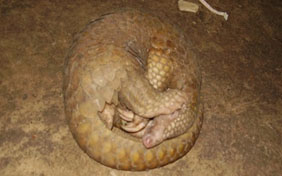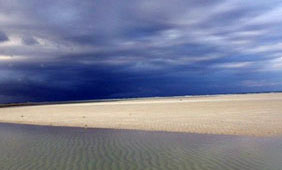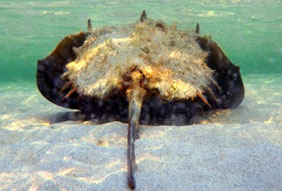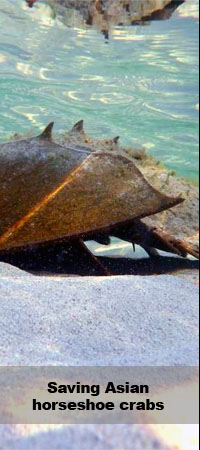|
Saving endangered wildlife and their habitats is at the core of Endangered Species Internationalís mission. Pangolins and Asian horseshoe crabs are highly threatened by illegal poaching and loss of habitat.
Pangolins are vanishing at massive rate
Pangolins are by far the most common species of mammal in international trade, with animals being taken from all across Asia to meet the demand for use in traditional medicines largely in China. Recent hauls include hundred tons of frozen pangolins from Sumatra, Indonesia, and Vietnam. Pangolin populations clearly cannot stand the rampant large scale poaching threat. Although pangolins are protected by national and international legislation throughout their range, poaching and habitat loss are severely depleting populations. Their scales are used in traditional medicines and their meat consumed mostly in Asia.
Of the eight existing pangolin species, four occur in Asia: the Chinese Pangolin, the Malayan Pangolin, the Philippine Pangolin, and the Indian Pangolin. The other four African species include the Cape Pangolin, the Giant Pangolin, the African White-bellied Pangolin, and the Long-tailed Pangolin. The Asian species are differentiated from the African species by the presence of hair between their scales. Pangolins save us millions of dollars a year in pest destruction by controlling termites and ants.
Sharp decline in Asian horseshoe crabs
Among the four species of horseshoe crabs found globally, three (Tachypleus tridentatus, Tachypleus gigas and Carcinoscorpius rotundicauda) are restricted to Asia and are facing significant threats. Their habitats include seabeds, intertidal sandy beaches and mudflats, mangroves, river inlets and seagrass beds. All those habitats serve as dwelling zones, foraging grounds, breeding areas, hatcheries and nurseries. Horseshoe crabs are extremely important place in the marine food chain as scavengers and as predators and prey, and that their eggs and young help sustain some bird and marine species.
Habitat destruction and degradation caused by land reclamation, coastal dredging and development, the construction of coastal fortifications that prevent beach expansion, shoreline modification, and the excavation and disturbance of seabeds. The harvesting and trade in Asian horseshoe crabs is an important cause of their decline.
Join Endangered Species International to protect Pangolins and Asian horseshoe crabs! We work very hard with no compromise to secure a future for endangered species, and your contributions make our work possible. Did you know that $0.98 cents of every dollar donated goes towards our conservation efforts? ESI is all about protecting endangered species and the places they need to survive hand in hand with local communities.

|
|

Philippine pangolin observed in the wild by ESI. © Endangered Species International

Habitat of the Asian horseshoe crabs. © Endangered Species International
 Asian horseshoe crab feeding along an intertidal beach. © Endangered Species International Asian horseshoe crab feeding along an intertidal beach. © Endangered Species International
 Asian horseshoe crab observed at ESI marine protected area. © Endangered Species International Asian horseshoe crab observed at ESI marine protected area. © Endangered Species International
|









